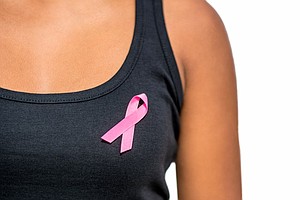10/12/2018

Source: BlackDoctor.Org
Anyone can get triple-negative breast cancer, however, African-American women are more likely to develop breast cancer at a younger age (under 50) and often have a more aggressive form of the disease called triple-negative breast cancer. This means that the cancer does not express the gene for estrogen receptor, progesterone receptor, or HER2 that can stimulate breast cancers to grow—and therefore is immune to many of the targeted treatments that can be used to block tumor growth. Triple-negative breast cancer tends to grow and spread more quickly than other types of breast cancer. Black women are three times more likely to develop triple-negative breast cancer than their White counterparts. In fact, research indicates that 20 to 30 percent of breast cancers diagnosed in African-American women are triple-negative.
Researchers have also found that it is more likely to affect:
Younger people. Triple-negative breast cancer is more likely to occur before age 40 or 50, versus age 60 or older, which is more typical for other breast cancer types.
Hispanic women. Triple-negative breast cancer most commonly affects African-American women, followed by Hispanic women. Asian women and non-Hispanic white women are less likely to develop this type of cancer. A study found that black women were 3 times more likely to develop triple-negative breast cancer than white women.
Healthy breast cells contain receptors for the hormones estrogen and progesterone. They also contain receptors for a protein called HER2, which stimulates normal cell growth. About two out of three women with breast cancer have cells that contain receptors for estrogen and progesterone, and about 20 – 30 percent of breast cancers have too many HER2 receptors.
Triple-negative breast cancer treatment options:
Breast cancer that is estrogen receptor (ER) and progesterone receptor (PR) positive can be treated with hormone therapies. Breast cancer with excess amounts of HER2 can be treated with anti-HER2 drugs such as trastuzumab.
In women with triple-negative breast cancer, the malignant cells do not contain receptors for estrogen, progesterone or HER2. Breast cancer that is ER, PR and HER2 negative cannot be treated with hormone therapies or medications that work by blocking HER2, such as trastuzumab.
All women can help reduce their risk of breast cancer by avoiding weight gain and obesity (for postmenopausal breast cancer), engaging in regular physical activity, and minimizing alcohol intake. Women should consider the increased risk of breast can- cer associated with combined estrogen and progestin hormone therapy use when evaluating treatment options for menopausal symptoms. In addition, recent research indicates that long-term, heavy smoking may also increase breast cancer risk, particularly among women who start smoking before their first pregnancy.
